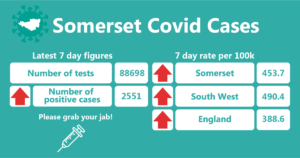Welcome to the latest edition of the weekly Somerset Covid-19 update for key stakeholders. This update is produced on behalf of the Somerset Covid-19 Engagement Board and is designed to provide a weekly update on the current Covid-19 situation in Somerset.
The number of cases of Covid-19 in Somerset has increased. Many of our cases continue to be among school and college-age children (particularly primary schools) as well as staff within education settings and you can read the detailed schools’ message later in this update.
As per the announcement this week, booster jabs will be available for people aged over 40 years to book from Monday 22 November, alongside the over 50s and those considered to be at risk. To receive a booster jab, it must be six months or more since the receipt of the second vaccine, but you can now book your appointment five months after your last dose. The boosters are very important as they significantly reduce the likelihood of serious illness or hospitalisation should you catch Covid-19 so, if offered, please make a booking without delay. Our vaccination centres across Somerset remain busy, but with slots becoming available all the time, please remember to check the National Booking Service regularly.
It was also announced that 16/17 year olds will be able to book their second jab, 12 weeks after their first.
Covid-19 is still with us and we are aware people might be talking about the pandemic less and possibly making riskier decisions with their behaviours. With this in mind, and also the fact people may be attending early Christmas events, we all should continue to wear a face-covering in crowded and enclosed spaces, wash hands regularly and undertake lateral flow tests if we don’t have symptoms and are meeting people who are outside our own household. If we have any symptoms of Covid-19 or other illnesses it is important not to mix with others and book a PCR test.
Latest Covid Dashboard: The following link below will take you to our website: Coronavirus (COVID-19) (somerset.gov.uk) Then scroll down the page until you get to ‘COVID-19 Dashboard’ in the list. Click on this and the dashboard will open.
‘Remember, everyone can catch it, anyone can spread it’.



| David Fothergill, Leader of Somerset County Council Twitter: @DJAFothergill | Trudi Grant, Director of Public Health Twitter: @SomersetDPH | Clare Paul, Cabinet Member for Public Health and Wellbeing Twitter: @Clarepaul_ |

In the week up to 14 November, approximately 88,698 tests were carried out across the county with 2,551 new confirmed cases. The rates have increased in the last reporting week to 453.7 per 100.000. This is below the South-West average but is higher than the national average.
Hospitalisation data for Somerset has decreased to around 50 Covid-19 in-patients in Somerset hospitals. The number of people in hospital with Covid-19 is higher than last year during wave 1 and wave 2 of the pandemic.
This Week’s Headlines:
The main item featured in this week’s update are:
- Workplace, Care and School settings
- Vaccination and Covid Booster update
- Variant Update
- Testing Update
- Latest Covid Catch-up Film – Vaccination Buddy Programme
- Resources and further information
Workplaces: We are still seeing sporadic outbreaks occurring as people socialise in and around the workplace. We continue to support these settings by providing public health advice and guidance around stopping the spread and reducing transmission.
It is helpful to remind staff that whilst having a positive Covid-19 result is a definite red light, having a negative result is not a green light. If you receive a positive test result you must isolate accordingly but a negative result does not mean you can stop carrying out the vital hands, face, space and fresh air measures. This continues to be an important part in stopping the spread of Covid-19.
Find out more about what you can do to keep working safely to reduce the risk of transmission via the Health and Safety Executive website.
Care Sector: We continue to see cases and outbreaks of Covid-19 in our social care settings. Infection Prevention Control (IPC) measures are essential to reduce the risk of Covid-19 as well as other infections. Good IPC practices require continuous monitoring and regular staff training is key to prevent not only Covid-19 but other winter infections. Regular testing, vaccination promotion, ventilation, monitoring for a wide spectrum of symptoms and prompt action where infection is suspected is essential, as well as promotion of health and wellbeing for both people we care for and staff.
Recognising and reporting outbreaks:
- Any suspected outbreak (influenza, Covid-19, norovirus/gastroenteritis) needs to be reported to our local health protection team at UK Health Security Agency (UKHSA) on 0300 3038162 or [email protected]
- UKHSA health protection teams and regional public health laboratories are prepared to arrange multi-virus testing when required for investigation of suspected outbreaks of respiratory viruses in care homes, enabling the right treatment pathways
- Influenza-like illness (ILI): managing outbreaks in care homes – updated 5 November 2021
- Adult social care: Covid-19 winter plan 2021 to 2022 – published 3 November 2021
Testing:
- Guidelines are updated frequently so it is important to ensure the most recent guidelines are followed for both regular monitoring and in an outbreak situation.
- Covid-19 testing for adult social care settings
- To determine the end of outbreak testing, all staff and residents should be PCR tested 14 days after the last resident or staff had a positive test result, or showed coronavirus-like symptoms.
Winter vaccinations:
- Both Covid-19 booster vaccinations and flu vaccinations are available
- The Covid-19 vaccination national booking service can be accessed by frontline health and social care staff who had their 2nd dose at least 6 months ago.
- Please book online via the NHS website or phone 119
Emotional support:
Support is available for care workers in Somerset – take a look at the dedicated online resource for all health and care workers in Somerset via the Somerset Emotional Wellbeing website.
Further information:
More information about Covid-19 in care settings can be found on the Adult Social Care webpage.
Schools and Early Years settings: In last weeks’ update we provided the updated advice from the Director of Public Health for Somerset, Trudi Grant. The current advice remains the same. All schools are advised to keep in place the following measures until the end of November, unless an individualised letter is received:
- Continue to use face coverings in secondary schools in communal areas such as corridors, when movement occurs between lessons and on school transport if used
- Reduce mixing between groups of students as much as possible. Consider pausing regular ‘whole school’ assemblies and other “large gatherings” indoors
- Promote social distancing and reduce crowding where possible; minimise pinch points in the school day, for example, staggered lunch times, or start times
- Reinforce social distancing and good infection prevention control amongst staff (ventilation and touchpoint cleaning especially in areas where staff gather)
- Any close or household contacts of confirmed cases of Covid-19 to book a PCR test and whilst awaiting test results, undertake a daily LFD test and only attend school if this is negative- this includes students of primary age under parental discretion. The new LFD tests are nasal swabs only and much easier to use than previous stocks
To read the full contents of the letter from Trudi Grant, Director of Public Health Somerset, please visit the Support Services for Education (SSE) website.
The SCC Public Health team plan to review all school risk assessments at the end of November and communicate any revised advice in a timely manner.
Primary school testing: Currently, we are seeing a rise in cases in primary schools in Somerset, therefore it’s important we continue to encourage household, parent and staff LFD testing. Please also be aware PH could advise daily LFD testing for certain groups during an outbreak.
Due to the current high levels of transmission in Somerset any close or household contacts of confirmed cases of Covid-19 who attend school are advised to book a PCR test and whilst awaiting test results, undertake a daily LFD test and only attend school if this is negative – this includes students of primary age under parental discretion. The new LFD tests are nasal swabs only and much easier to use than previous stocks.
Extra-curricular Events and Activities: Schools wishing to hold extra-curricular events this winter term will be provided with advice from Somerset County Council’s public health team during webinars occurring on Tuesday 23 November or Wednesday 24 November.
Led by the Somerset Wide Covid Support Officer for Events and Public Gatherings, the events will take place as part of the Somerset Association for Secondary Headteachers (SASH) meetings, but are open to school leaders from across Somerset
Symptomatic and Asymptomatic Testing: From 1 to 7 November 18,888 tests were recorded with 198 positive, bringing the positivity rate down to 1.0%, from 1.9% in the previous week.
Parents or carers of a school or college age child, health, care or education staff are requested to undertake twice weekly asymptomatic testing using LFDs, so those you meet or work with are kept safe from infection.
Over 70,000 LFD test results were reported by parents in October. The reporting of both positive and negative tests is important to help us understand the spread of the virus and should be encouraged, please report any result via the GOV.uk website.
If staff or a pupil is identified as a close contact, they may be asked to take daily lateral flow device (LFD) tests, while they wait for their PCR test result. In this scenario, the staff member or pupil should continue to attend school or college as long as their LFD test results remain negative and they feel well.
SCC PH advice remains consistent with national guidance:
- Only use twice weekly LFD testing for asymptomatic cases
- Make sure you do an LFD according to the instructions and at least 30 minutes after eating or drinking or vaping
- If you get a positive LFD or have symptoms get a PCR and use the supervised PCR testing route at test centre to get the best quality test
- Encourage secondary school age children to wear face coverings in crowded or enclosed places, for example on school transport
- Take up the offer of vaccination
If a child is a close contact but has not been contacted directly by NHS Test and Trace then they should take a PCR test via the GOV.uk website or by calling 119.
When ordering a PCR test it is important to check the box (online) or tell 119 ‘I’ve been told to get a test by my health protection team’ and not ‘I’ve been told to get a test by my school or nursery’
Childhood Immunisation Programme: This year, the Covid-19 and flu vaccines are being rolled out together for 12-15 year olds through the schools’ immunisation programme. If schools have a slot booked for flu vaccinations and for Covid-19 vaccinations, they should keep both slots.
Immunisation sessions should still go ahead as planned when a school has a Covid-19 outbreak, unless specifically advised not to by a health protection team (HPT) or Director of Public Health (DPH). Other factors which may impact on the ability to offer immunisation sessions include the number of children still in school and whether the school has had to send some year groups home or close due to lack of staff. Find out more information via the NHS website.
A full range of resources and information can be found on the SSE website.
Covid-19 Vaccine Programme: Most schools should now have confirmed dates scheduled for a visit from their School Age Immunisation Service (SAIS) team.
Special school staff are eligible for Covid-19 boosters. This will need to be 180+1 days from the second dose but staff should be able to book on the National Booking System.
12-15 year olds who have missed their school vaccination date (due to absence or illness) are advised to book their vaccination online. You now need to wait 12 weeks until after you tested positive for Covid-19 before you can be vaccinated. To book or manage your vaccine, please visit the NHS website.
Bookable slots for 12-15-year-olds: There are a significant number of bookable slots for 12 -15-year-olds at vaccination centres at, Somerset Motor Museum in Sparkford and Firepool in Taunton. You can book through the National Booking Service online or by calling 119.
Please note: If you’ve had a positive Covid-19 test, you need to wait 12 weeks before having your vaccination. This starts from the date you had the test
The vaccine is not mandatory; the decision to have the vaccine is a personal decision. The role of schools is to facilitate access for those who wish to receive the vaccine.
Vaccination Update: This week it was announced that, from 22 November, 16 and 17 year olds will be able to book their second dose 12 weeks after their first and also those aged over 40 can receive their booster.
It remains very important for anyone who has not had their first or second dose of the Covid-19 vaccine to do so as soon as possible. While the first dose starts to provide some immunity, it is only two weeks after the second dose when you are considered to be ‘fully vaccinated’. And please accept your offer of a booster jab should you receive one.
For more up information and updates about the Somerset vaccination programme visit the NHS website.
Booster Vaccines: Like some other vaccines, levels of protection for the Covid-19 vaccine may begin to wane over time. With Covid-19 rates still high again this winter, the booster dose will help extend the protection gained from the first 2 doses, giving longer term protection against becoming seriously ill from Covid-19. We would particularly encourage those over 70 years old who have not had or booked their booster to do so now. Work is being done to increase the booster uptake in the over 70s to reach the level of take-up seen in the initial two vaccination phases. If you fall into any of the following groups, you are eligible to book their booster jab.
- People aged over 40 and over (from 22 Nov).
- People who live and work in care homes
- Frontline health and social care workers
- People aged 16 and over who are a main carer for someone at high risk from Covid-19
- People aged 16 and over who live with someone who is more likely to get infections (such as someone who has HIV, has had a transplant or is having certain treatments for cancer, lupus or rheumatoid arthritis)
People who are pregnant and in one of the eligible groups can also receive a booster jab.
To book your booster jab visit the Covid National Booking Service online, call 119, or wait to be contacted by the NHS to book your appointment. Book anytime in the four weeks leading up to the end of the six month period from when you had your last vaccination.
Variant Update: There have been some discussions on the news recently regarding a “Delta plus” variant. This is currently classified as being a variant under investigation by the UK Health Security Agency (UKHSA), who constantly monitor Covid-19 variants which arise. You may also see this variant be referred to as “VUI-21OCT-01” or “Delta AY.4.2” Out of the positive PCR tests which have been sequenced, this particular variant accounts for 14.7% of cases from 31 October – 6 November. Out of all the Delta AY4.2 cases identified since the 8 November, 13.3% of them were identified from cases in the South-West. Fortunately, vaccine effectiveness against symptomatic infection with this variant is very similar to that seen for Delta. For more information on this variant, please read the SARS-Cov-2 variants of concern and variants under investigation in England – Technical briefing 28.
The same control measures are effective at controlling the spread of this new variant of Covid-19.
Testing Update: All viruses mutate through natural mistakes which occur when they replicate. However, when one of these mistakes gives an advantage to the virus a new variant can quickly establish and become the dominant strain in circulation – as has happened with the Alpha and Delta variants. The best way to lower the chances of mutations occurring and new variants appearing, is to try and reduce the prevalence/spread of infection. This is why it is still very important to:
- Get the vaccines if you are eligible, as soon as possible
- Regularly test using a lateral flow test if you do not have symptoms, and ensure you self-isolate immediately and get a follow up PCR if you test positive by LFT
- If you have symptoms of Covid-19, self-isolate immediately and get a PCR test
- Socially distance from others when you are able too
- Socialise outdoors where possible
- Ensure if mixing inside, there is adequate ventilation
- Continue to wash your hands frequently, whether using soap and water, or hand sanitiser
- Wear a facemask in crowded or public spaces
- Complete contact tracing with NHS Test and Trace if you test positive by PCR and self-isolate for 10 days.
- Take a PCR test if you are identified as being a close contact to a case.
For more information on PCR testing, please visit the Somerset County Council website.
For more information on rapid lateral flow testing, please visit the Somerset County Council website.
Covid Catch-up Film – Vaccination Buddy Programme: This week Clinton discusses the excellent work done by the Vaccination Buddies who speak directly to those people across our many diverse communities who may have questions regarding the vaccine. He also chats about the importance of first, second and third doses of the vaccine. The film can be viewed on YouTube.
People who are worried about having the vaccine can be referred (or self-refer) to the scheme and a fully trained Vaccination Buddy will then contact them by phone to discuss their concerns and offer information and assurance. Anyone can make a referral via a short form available on the Spark Somerset website.
Feedback from some people who’ve used the service:
- “Julie was well informed and non-judgemental. She gave me lots more insight and reasons to say ‘Yes’ to the vaccine.”
- “It was excellent. He was a really nice guy.”
- “It was good to have someone to talk to. I would 100 percent recommend people talk to a Vaccination Buddy if they have questions. I have told my work colleagues about it.”
Resources and further information: Please do keep an eye our Healthy Somerset website, which has a huge amount of information and resources to help keep everyone healthy happy and safe at this time.
For the latest local information as well as digital resources, posters and flyers please visit the Somerset County Council website.
The Somerset Local Outbreak Management Plan outlines how we, the council, will work with the NHS Test and Trace Service, PHE, the NHS and other partners to ensure a whole system approach to preventing and managing local outbreaks. This can be found here.
Finally, please like them on Facebook, follow them on Twitter and share their posts with your networks to help them in communicating these important messages. Follow their Director of Public Health Twitter account too.

